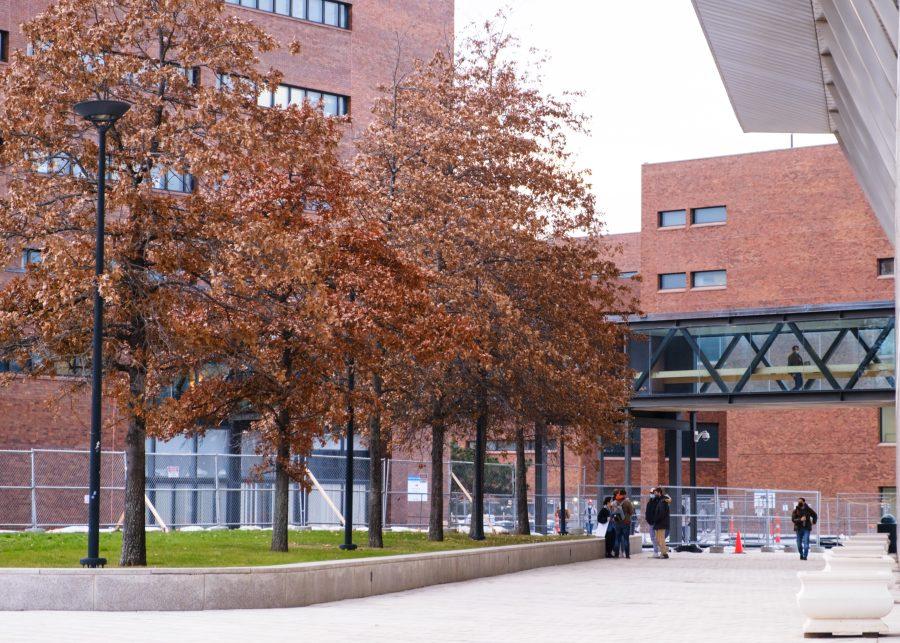In a course focused on the practical and local history of labor and working-class organizing in Boston, it is necessary that students be exposed to the leaders in that field today. This is the opportunity provided in “HIST/LABOR 390: Working–Class Boston,” a course that introduces students to the working-class and urban history of Boston in the 20th and 21st centuries and combines that history with practical applications in career-oriented activities and assignments. Taught by Assistant Professor of History and Labor Studies Nick Juravich, this class exists as part of a cohort of courses funded by the Mellon Foundation aimed at demonstrating to students how humanities courses can train them for productive careers. This was at the core of the conversation when Jessica Wender-Shubow came to speak to the class about her work as the president of the Brookline Educators Union.
One of the main topics that Wender-Shubow addressed was the necessity of analyzing the intersection of race and class workplaces—specifically educational settings—and how labor unions push to address racial and class inequalities together. The BEU is currently fighting for schools to hire and retain educators of color, but more than just getting people in the door, their goal is to challenge the structures that keep people of color out of the school system, and to get administrators to ask themselves why the pool of educators of color is so small. This is a question of class and system structures, and Professor Juravich related it to a reading from the earlier in the semester, Mel King’s “Chain of Change: Struggles for Black Community Development,” which argues that Boston’s educational system reproduces class structures and inequalities by reinforcing racist assumptions about the skills and career preferences of Black students.
Wender-Shubow gave an example of how schools are making progress in thinking about race, but not class, and argued that without examining intersection of both, the system will never change. Brookline schools set up a support group for educators of color to talk about what it’s like to be an educator of color in this community, but the conversation was managed through the school system and organized by administrators of color. In contrast, the BEU advocates for there also being an independent space in which educators in many positions—educational support professionals as well as K-12 teachers—can speak their minds without the pressure of the power dynamics present when management is involved.
Students responded to this talk with a number of passionate and poignant stories, questioning how these ideas work practically. Student Taylor shared their own experience of racial disparity among educators in the classroom, living in a diverse town where 85 percent of the teachers are white and aren’t local to the community that they teach in. “There is a lack of teachers of color in a very ‘progressive’ town,” they said. “There is a lack of experience for Black students of education. They are being left out of the pipeline. How can we change this?” In response to this question, Wender-Shubow agreed and said that the only way to fix these issues is to rethink education at the most basic level. “If you’re serious about a multi-cultural society in a substantive way, then you have to allow schools to bring a really radical range of understanding. People will have to be willing to critically analyze how ideas of skill and intelligence contribute to class formation,” she said.
In relation to ideas of unity in the workplace, student Izabel also shared a personal story about a racist comment she received from someone who considers themselves progressive, creating a divide between the two of them. “Institutions don’t change unless groups of people are united in changing them,” Wender-Shubow said in response, relating this to the ways conversations about race in K-12 schools are most often individualistic and about performance, not about how to radically change schools and society together. Student Susan added a comment about the ways being tired and overworked perpetuates a flawed system by not allowing overworked individuals the time to form a community with each other.
One of the most important points Wender-Shubow made relates to how students will go on to view themselves as workers in their field. She made the compelling point that it is difficult for teachers to stand up and demand compensation, often because they are characterized as pursuing their career out of love and a desire for service. Without diminishing this, Wender-Shubow drew a comparison to the airplane safety of putting on your oxygen mask before helping others in order to emphasize the importance of educators being workers who deserve fair compensation and must stand up and fight for it in order to fulfill their roles as teachers. Not all students will pursue a career in teaching, but this principle demonstrates one aspect of how students can recognize their work as valuable and a contribution to society, whatever career they pursue. Even beyond this, the course as a whole is career-oriented by giving students the opportunity to ask guest speakers questions about how history matters in their current work and how the work being done in the classroom translates to career settings beyond the academy, as is the case for Wender-Shubow.
As those who will leave the classroom and enter workplaces full of issues related to gender, class, race and citizenship, students must learn to approach their work on an intersectional level. Through reading, presentations, group activities, guest speakers and research, students come to understand what it means to be a part of working-class Boston, both historically and in the present. In this, they are exposed to the theoretical and practical tools they will need to be critical thinkers and work toward systemic change in their future careers.
Students learn the importance of an intersectional lens in working-class Boston
UMass Boston’s Campus Center and Wheatley Halls. Photo by Josh Kotler / Mass Media Staff
About the Writer
Josh Kotler, Photographer

